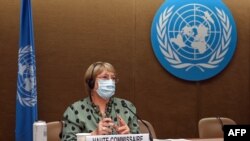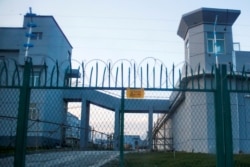A coalition of 41 countries is calling for access to internment camps in China’s Xinjiang region to check on the situation of an estimated one million Muslim Uyghurs who allegedly are being detained under abusive conditions.
Canada issued the cross-regional joint statement at the U.N. Human Rights Council Tuesday. In her delivery, Ottawa’s ambassador to the United Nations in Geneva, Leslie Norton, stressed the urgency of getting to the bottom of this human rights situation.
“Credible reports indicate that over a million people have been arbitrarily detained in Xinjiang and that there is widespread surveillance disproportionately targeting Uyghurs and members of other minorities and restrictions on fundamental freedoms and Uyghur culture," she said. "There are also reports of torture or cruel, inhuman and degrading treatment or punishment, forced sterilization, sexual and gender-based violence, and forced separation of children from their parents by authorities.”
Norton urged China on behalf of the coalition to allow immediate, unfettered access to Xinjiang for independent observers, including the U.N. high commissioner for human rights.
This follows a similar request made by rights chief Michelle Bachelet at the opening of the council session Monday.
“I continue to discuss with China modalities for a visit, including meaningful access, to the Xinjiang Uyghur Autonomous Region, and hope this can be achieved this year, particularly as reports of serious human rights violations continue to emerge,” she said.
Beijing has described the detention camps as vocational centers aimed at stopping religious extremism and terrorist attacks.
China said it welcomes a visit by the high commissioner to China, including Xinjiang — but on condition that it be a friendly visit and not a so-called “investigation” under the presumption of guilt.
China also responded quite differently to the joint statement that demanded access to the camps in Xinjiang.
Minister Jiang Duan simply ignored it. Instead, he conveyed his deep concern about the serious human rights violations suffered by indigenous people in Canada. His statement was supported by seven countries — Russia, Belarus, North Korea, Venezuela, Iran, Syria, and Sri Lanka.
“Historically, Canada robbed the indigenous people of their land, killed them, and eradicated their culture... We call for a thorough and impartial investigation into all cases where crimes were committed against the indigenous people, especially the children,” said Jiang Duan.
The Canadian ambassador acknowledged that indigenous people still faced systemic racism, discrimination, and injustice, but added her government was working to right these wrongs.





